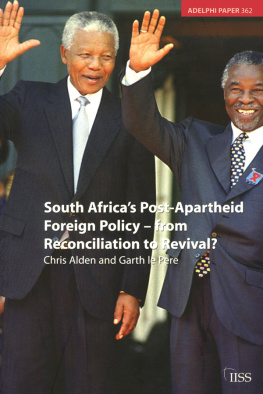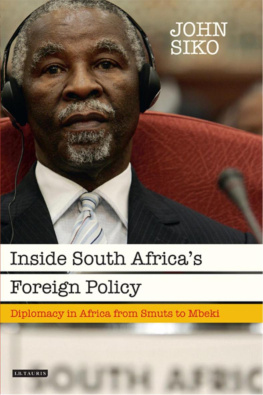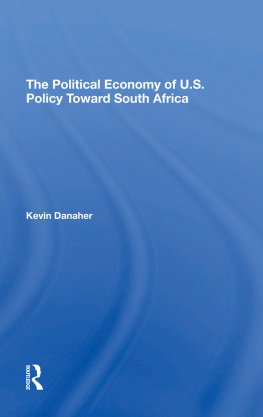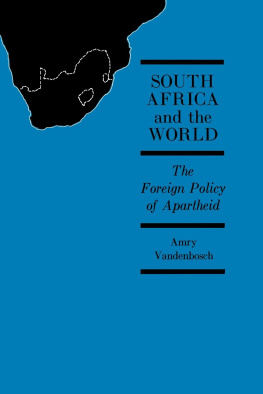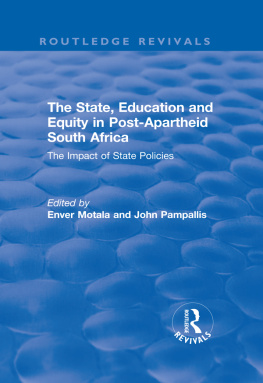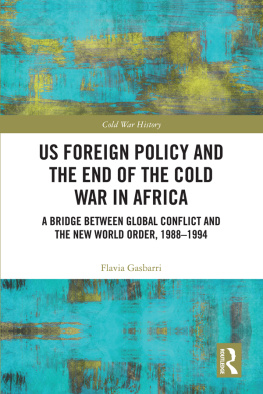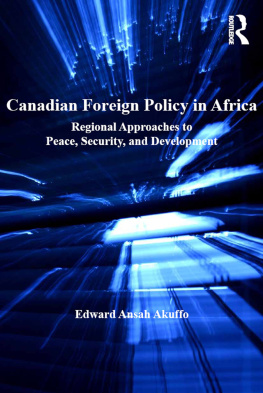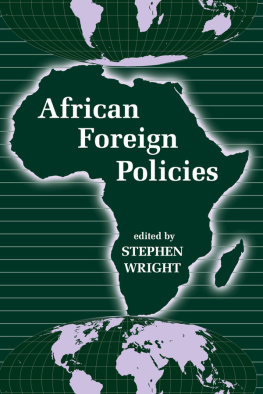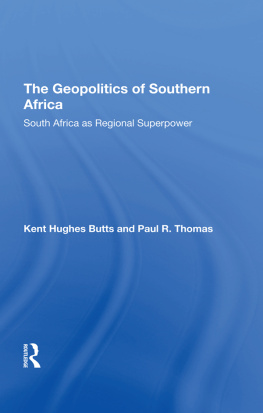
The United States, South Africa and Africa
The United States is a global superpower at the heart of the international system; South Africa is a regional hegemon on a peripheral continent. Yet, despite the US and South Africa's disparate positions in the international order, in this book Dr. Brian J. Hesse makes the claim that the foreign policies of each towards Africa in the 1990s evolved comparably, ultimately becoming strikingly similar near the end of the decade. A central feature of this comparable evolution and eventual congruence, he argues, is the correlation between 'grand foreign policy aims' the overarching tenets and doctrines which prevailed in US and South African foreign policies towards Africa and 'modest means' the limited availability or limited utilisation of resources.
Of Grand Foreign Policy Aims and Modest Means chronologically identifies integral variables in the evolution of US and South African foreign policies towards Africa in the 1990s events, conditions, personalities, and processes, and where, when, and how they interacted and illustrates how, for example, a foreign policy pronouncement made in the late 1990s is conceivably related to, if not the culmination of, an act from earlier in the decade. The book is a valuable resource for those wishing to understand better the complex politics of Africa, and specifically, the dynamic US and South African foreign policies which have impacted on, and been influenced by, the continent.
To Karen, my best friend in life, for life.
The United States, South Africa and Africa
Of grand foreign policy aims and modest means
Brian J. Hesse
Associate Director, Washburn University, Kansas
First published 2001 by Ashgate Publishing
Reissued 2018 by Routledge
2 Park Square, Milton Park, Abingdon, Oxon OX14 4RN
711 Third Avenue, New York, NY 10017, USA
Routledge is an imprint of the Taylor & Francis Group, an informa business
Copyright Brian J. Hesse 2001
All rights reserved. No part of this book may be reprinted or reproduced or utilised in any form or by any electronic, mechanical, or other means, now known or hereafter invented, including photocopying and recording, or in any information storage or retrieval system, without permission in writing from the publishers.
Notice:
Product or corporate names may be trademarks or registered trademarks, and are used only for identification and explanation without intent to infringe.
Publisher's Note
The publisher has gone to great lengths to ensure the quality of this reprint but points out that some imperfections in the original copies may be apparent.
Disclaimer
The publisher has made every effort to trace copyright holders and welcomes correspondence from those they have been unable to contact.
A Library of Congress record exists under LC control number: 2001089096
ISBN 13: 978-1-138-72391-7 (hbk)
ISBN 13: 978-1-315-19276-5 (ebk)
A superpower at the heart of the international system, a regional hegemon whose influence and potential dwarfs all others in sub-Saharan Africa, and a peripheral continent susceptible to the foreign policy preferences of two countries so placed that was the appeal. I knew I wanted to explore the foreign policies (plural) of both the United States and South Africa as they applied to the continent of Africa. However, appeal does have to be grounded with a degree of practicality. In covering two countries' foreign policies (albeit towards the same continent), there was the danger of conducting two individual studies with little more than a shared title. There had to be a common focus.
Like any self-respecting researcher, my first step in the search for a common focus was to conduct a literature survey. From a cursory effort I came up with hundreds of titles by countless authors covering innumerable dimensions of the subject area I was considering. For example, within one twenty-item range I found authors and titles addressing US and South African bilateral and multilateral relations, the United States' arming of the Horn of Africa, the South African arming of Mozambique, the 1975 South African invasion of Angola, the 1992 American intervention in Somalia, and biographies about individuals who had been instrumental in some, or all, of the above. 1 had to create some parameters. To these ends, I formed a hypothesis that was as broad as it was simple. It stated: In the 1990s, the United States and South Africa have each exerted influence in African affairs.
In testing this one sweeping generalisation, three observations emerged:
- 1) It appeared that through the Cold War and apartheid eras (roughly from the 1950s until 1990), US and South African foreign policies were dominated, respectively, by two 'grand foreign policy aims' that is, two overarching doctrines. In the US case, it was Soviet 'containment'; for South Africa, 'security', but of a very specific kind: security for the white minority;
- 2) at the start of the 1990s, US and South African foreign policies were exposed to incredible changes, and subsequently, underwent transformations; and
- 3) most intriguingly, it seemed that the foreign policies of each towards Africa had become strikingly similar near the end of the 1990s, if not in content, then in tone.
These observations begged the questions: In the interim between the foreign policy sea-changes circa 1990 and the latter half of the decade, what 'happened' generally in US and South African foreign policies towards Africa? And how was it that, in spite of the United States' and South Africa's disparate positions in the international order and available resources, their foreign policies towards Africa apparently became similar?
Thusly focussed on a particular dimension of the subject I wanted to explore, I did another literature survey. In contrast to the voluminous number of works I found with my first literature survey, this time I turned up relatively few contemporary works. Quite simply, not many existed. As for the works that did exist, most were either speculative, event-inspired, or topically eclectic. In the first 'speculative category', studies such as The United States and Africa: Into the Twenty-First Century stand out. Studies like these had one or two editors, a number of contributing authors, and articles a few thousand words in length that often encompassed topics ranging from the effects of HIV, to regional integration, to the global information economy and Africa's place within it. While I do not mean to imply that contemporary works like the ones noted above were not serious academic efforts indeed, many have influenced this work it was clear that research gaps existed in the subject area I was probing.
Returning to what contemporary works existed, I was struck once again by the prevalence of grand foreign policy aims. As was the case in the Cold War and apartheid eras, overarching tenets and doctrines continued to be a feature of US and South African foreign policies towards Africa in the 1990s. However, unlike the Cold War and apartheid eras, where containment and security overshadowed all else for nearly half a century, it appeared US and South African foreign policy makers had articulated a sundry of grand foreign policy aims, and did so over a comparably short period of less than ten years. So many aims in such a short time suggested either ambition or necessity, but certainly confirmed dynamism. It was only then that I arrived at a three-fold focus for this book:


